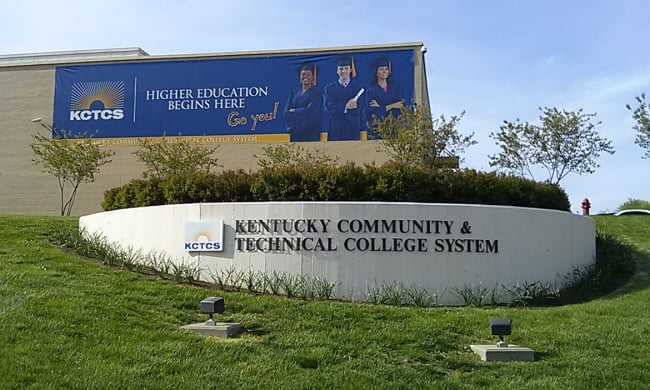You have /5 articles left.
Sign up for a free account or log in.

Kentucky Community & Technical College System
KCTCS
The campaign for free community college hasn't slowed in the wake of Tennessee and Oregon moving to cover tuition costs of recent high school graduates who pursue higher education at two-year colleges. Major cities like Detroit are pushing forward with their own plans, and now one more state is close to covering tuition and fees for its students.
Kentucky’s House of Representatives passed a community college scholarship plan last week that moves the state one step closer to a statewide plan in the style of the Tennessee Promise program.
"This is a great opportunity. There are nine or 10 other states out there looking at this type of legislation this year … Kentucky will hopefully join that group and we'll continue to advocate for this as it moves through the process," said Jay Box, president of the Kentucky Community & Technical College System.
The Work Ready scholarship bill would provide so-called last-dollar aid for up to six semesters to newly enrolled students in the two-year system. Last-dollar aid means students would receive additional funding from the state to cover any tuition and fees that federal and state grants or assistance programs do not. As a result, the bill is closer to Tennessee's approach than to President Obama's, which is a first-dollar plan that would cover tuition and fees up front.
To be eligible under the bill, students must be graduates of Kentucky high schools or hold a GED or high school equivalency. They also must maintain 12 credits per semester and a 2.0 grade point average. The program is estimated to cost about $13 million in its first year and about $20 million the second year, Box said, eventually reaching about $24 million in annual costs. The plan would benefit more than 3,200 students who are expected to enroll this fall.
“All of that is very contentious at this time because the budget is such a tight budget and the governor’s budget had a 9 percent cut in state appropriations to all colleges and universities,” he said.
Whether or not the legislation will make it through Kentucky’s Senate, where Republicans hold a majority, is still up for debate. The Senate has their own version of a free community college plan, but that bill has been languishing in committee.
The Senate plan also includes a dual enrollment scholarship and an apprenticeship program, which the other version lacks, Box said.
“The Senate bill would limit the Work Ready scholarship to only high school graduates entering technical programs, whereas the House version was open to high school graduates entering any technical program or university-transfer pathway,” Box said, adding that the Senate version also would expand eligibility for the scholarship from just students at the community and technical college system to those attending any four-year university or private institution that has an associate degree program.
Morley Winograd, president of the Campaign for Free College Tuition, said most of the promise plans he's examined have career or technical scholarships as an additional focus, but he's not aware of any that exclusively focus on career and technical education.
“We’re excited by the activity in Kentucky and the support from the [state] House with a promise program that does look a lot like Tennessee,” Winograd said.
There’s still about a week left in Kentucky’s session to see which plan, if any, reaches the governor’s desk.
“We’re still hopeful because there’s some interest on the Senate side,” Box said. “The governor has made part of his platform about the advancement of workforce education and workforce training in the state, so one would think that this would be of high interest to him.”
Republican Governor Matt Bevin hasn’t weighed in on the Work Ready legislation, said Box. But he believes the legislation stands a better than 50 percent chance of reaching the governor.
“The focus on technical graduates right now is a reflection of where the highest demand in job openings [is] in the state of Kentucky,” Box said. “Kentucky is a state that is very much tied to the manufacturing industry and right now it is growing and there are thousands of jobs opening and we can’t turn out enough graduates to fill the need.”




